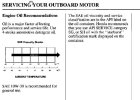Agreed Cape Codder. It's tough when guys like us who do not work on boats for a living, rather, use them on the weekends try to do maintenance ourselves. Everyone has an opinion on what is best, etc. Somewhat off topic, but last year I purchased an aftermarket fuel filter from a reliable brand name company. Turns out, the glue that held the filter element in place disolved when it came into contact with the 10% ethanol in our CT fuel. The glue traveled into my VST and stuck the needle open - flooding it and sending raw fuel out the vapor recapture. I noticed it when there was a rainbow trail behind the boat approaching the dock. I sent my mechanic's report along with the old filter back to the company and they refunded me the entire $400 repair bill (which included a VST and fuel system cleaning). Went back to a Honda filter and had no further issues. Since, I'm just not comfortable using anything but OEM. Likewise, I use regular automotive 10-30 oil and change it frequently. Some guys go out and buy a Honda Accord oil filter for their marine engine. That is a also a mistake, the marine filters have a different design and seal... just some additional thoughts.
Big Dave - you know we're buddies.

